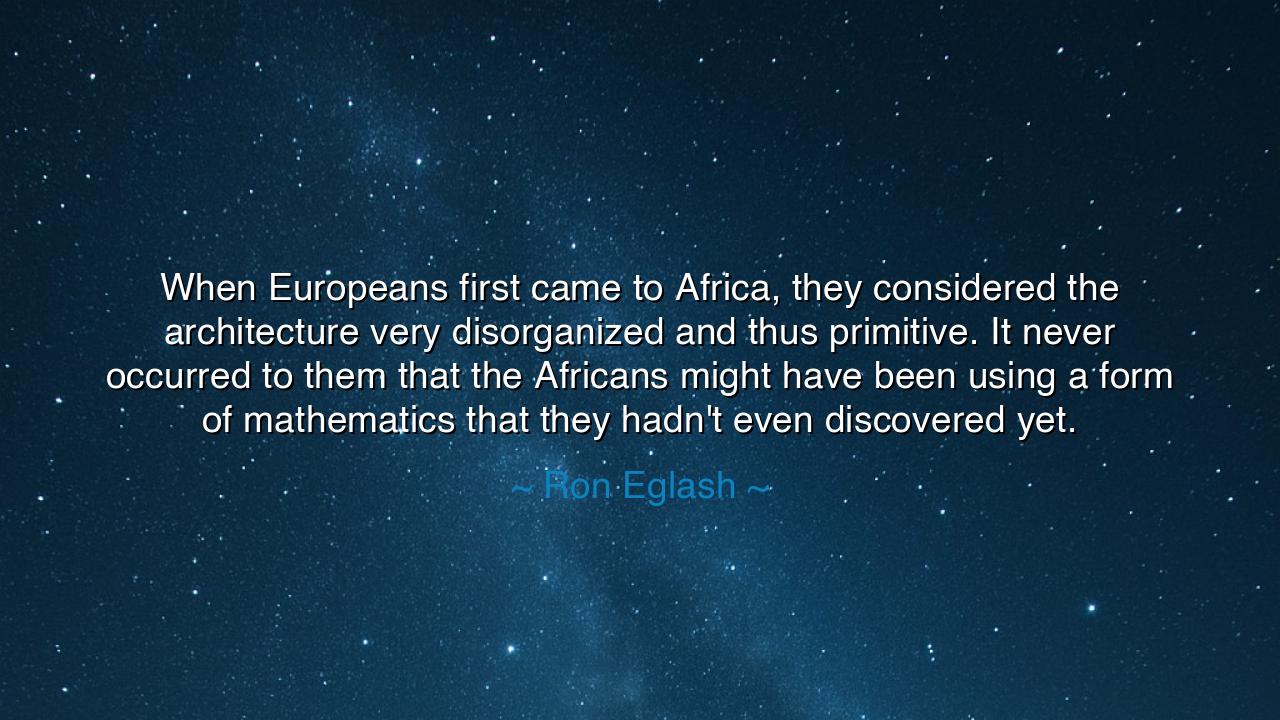
When Europeans first came to Africa, they considered the
When Europeans first came to Africa, they considered the architecture very disorganized and thus primitive. It never occurred to them that the Africans might have been using a form of mathematics that they hadn't even discovered yet.






Host: The café was warm, the faint sound of rain outside mingling with the quiet murmur of conversations in the background. The soft lighting created a welcoming, intimate atmosphere, perfect for reflection. Jack and Jeeny sat across from each other, each of them lost in thought, the space between them filled with a quiet tension as the evening unfolded.
Jeeny, her fingers lightly tapping on her coffee cup, spoke first, her voice calm but carrying the weight of her thoughts.
Jeeny: “I came across something by Ron Eglash today. He said, ‘When Europeans first came to Africa, they considered the architecture very disorganized and thus primitive. It never occurred to them that the Africans might have been using a form of mathematics that they hadn't even discovered yet.’ What do you think about that?”
Jack: He raised an eyebrow, clearly intrigued. “That’s a really thought-provoking idea, isn’t it? The assumption that something is primitive just because it’s different from what you’re familiar with. It’s easy to dismiss cultures and practices we don’t understand, to label them as inferior or less advanced, when in reality, we might just be missing something. The idea that African architecture was built on a form of mathematics unknown to Europeans at the time—well, that flips the narrative, doesn’t it?”
Host: The rain outside had softened, its gentle tap against the window like a quiet rhythm accompanying their conversation. Jeeny’s voice, steady but filled with a quiet understanding, continued.
Jeeny: “Exactly. It’s not just about architecture, either. It's about the biases we carry with us when we encounter something unfamiliar. European colonizers, and many in the West, had this preconceived idea that their ways were the standard, and anything that didn’t fit into that framework was seen as primitive or chaotic. But Eglash is suggesting that just because something is different doesn’t mean it’s less. It might be based on principles or knowledge we haven’t yet discovered.”
Jack: “Right. It’s about perspective. We tend to see the world through our own lens and assume that other cultures’ ways of doing things are less sophisticated just because they don’t match our understanding of the world. It’s humbling to think that there’s an entire history of knowledge and math in African architecture that went unnoticed because it didn’t align with what Europeans thought was important.”
Jeeny: “Yes, and it’s a reminder that history is so often written by those in power, by those who get to define what progress and sophistication look like. But when we look more closely, we see that knowledge and innovation exist in all cultures, even if they don’t always fit into the frameworks we recognize. That African architecture, for example, might have been built on principles of mathematics that were just as complex, if not more so, than the European systems at the time.”
Host: The café seemed to quiet even more, as if the weight of their conversation had brought the world outside into sharp focus. Jack, typically skeptical of broad claims about history, now seemed lost in thought, reflecting on the deeper implications of Jeeny’s words.
Jack: “It’s interesting, isn’t it? How easy it is to dismiss what you don’t understand. But real growth, real knowledge comes from listening, from being open to seeing things in new ways. And that means questioning the assumptions we make about what’s advanced and what’s primitive.”
Jeeny: “Exactly. It’s not just about rethinking the past, but about recognizing that all cultures have their own innovations, their own contributions to the world. The idea that mathematics in African architecture could have been a form of knowledge that was overlooked simply because it didn’t match the Western ideal is both humbling and eye-opening. It challenges us to rethink our definitions of what’s advanced, and what’s truly important.”
Host: The world outside the café had faded, and inside, the conversation between Jack and Jeeny had shifted something in the air. They realized that understanding cultures, and their innovations, required more than just surface-level observations. It required an open mind—one willing to look beyond bias and see the complexity and beauty that exists in the ways we build, live, and create. The idea that African architecture might have been built on its own form of mathematics, a knowledge system yet to be fully understood by the West, was a quiet reminder of how much is often overlooked in our rush to define the world in narrow terms.






AAdministratorAdministrator
Welcome, honored guests. Please leave a comment, we will respond soon